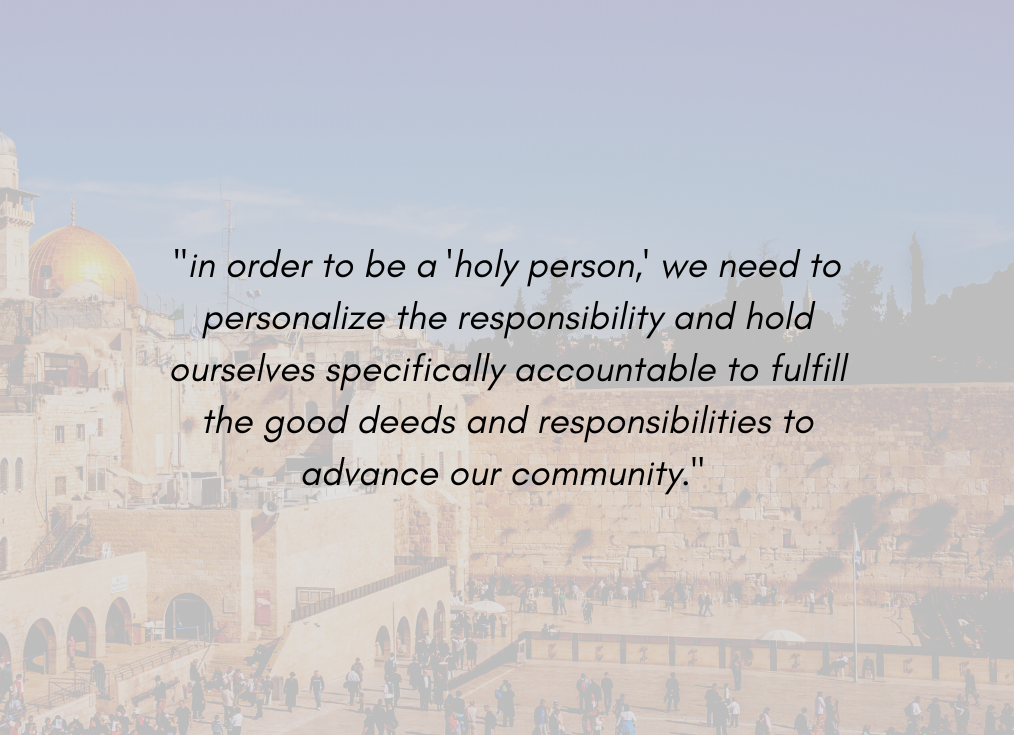A Holy Nation

February 17, 2023
There is a writing technique known as the “general-to-specific structure” or “deductive composition,” where the progression of ideas flows from broad declarations to specific details. If we look at last week’s Torah portion, Yitro, and read it as one connected sub-story from the Book of Exodus with this week’s Torah portion, Mishpatim, we find two interesting pronouncements by Gd:
“You shall be to Me a kingdom of priests and a holy nation.” (Yitro, 19:6)
“You shall be holy people to Me.” (Mishpatim, 22:30)
So, what happened between these two declarations? Why the change in designation? Our scholars explain that leading up to receiving the Ten Commandments, Gd calls for the people to be a “holy nation” because they have no personal responsibilities for which to be accountable. However, only until after this week, having now received specific laws on how to live their daily lives, Gd commands the nation to be a “holy people.”
You see, we can live together, generally support each other, rely on the handful of individuals or organizations who take care of those in need, and call ourselves a community, even a “holy nation.” However, like the deductive writing structure, in order to be a “holy person,” we need to personalize the responsibility and hold ourselves specifically accountable to fulfill the good deeds and responsibilities to advance our community.
This week in Israel, we saw these values displayed in full effect. Unlike in many countries across the globe, when citizens have taken to the streets to voice their concerns, share their public criticism, or gather in support of a common goal, which has led to clashes with authority, arrests, and even public beatings, in Israel this week the right to demonstrate was peaceful, positive, and passionate, and recognized by both sides as a right to gather affirmed in a free and democratic country.
To be clear, this column is not about taking sides on an issue; rather, it is to highlight that Israeli politics is messy. Israel is a country about to celebrate its 75th birthday (stay tuned for more information about the JCC’s Yalla 75 Yom Ha’atzmaut celebration). For context, the United States went from being a united country following its war for independence in 1776, to then engaging in a civil war before its 85th birthday. Heaven forbid Israel collapses into a civil war, but Israelis need to figure out the specifics of how Israel is going to move forward. Up to now, Israel has had a general structure defining its unity and “holy nation” status. For the citizens to earn their “holy person” honorific, they will need to live up to the values, morals, and ethics of our faith.
Many scholars have tried to identify the reason Judaism has survived mightier empires, more powerful dynasties, and greater kingdoms. But the reason is simpler and more obvious than complex. It is the requirement of the minyan. Judaism cannot be practiced alone. To fulfill the requirements, obligations, and commandments of our faith, one needs community.
This week, may we embrace the general qualities of our community that validate the reasons we live where we do and let us also reach out to a specific friend, neighbor, or even distant acquaintance with whom we have not spoken to for a while and let them know we are here for them. These specific actions are what make a difference in our lives. And if you have more love to share and would like us to connect you with one of our Jewish outreach and support organizations across the Jewish community, we are always looking for active, caring, and interested volunteers. Please contact the Jewish Federation, and we will match you to the organization that best meets your interest. These specific behaviors are how we sanctify our faith. Because we are…
STRONGER TOGETHER.
Shabbat Shalom,

